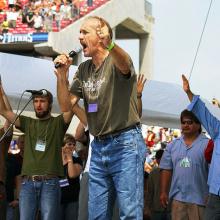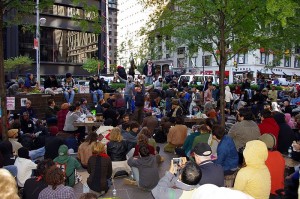Detroit
A big change came down in Detroit this spring. Under sanction of Michigan’s Emergency Manager Law (Public Act 4), on April 4 the city council authorized a “consent agreement” ceding its authority over the budget to a shadow body of corporate leaders (emergency manager by committee). For some, this bodes fast-track redevelopment and downsizing the city. For others, it means the end of collective bargaining. For Detroiters, it’s the blunt face of political disenfranchisement.
Although Public Act 4 is being challenged for its constitutionality in court and for its political legitimacy in a statewide repeal effort, the assault on local democracy remains in full tilt. Triggered by financial insolvency, governor-appointed emergency managers are empowered from above to remove top administrators and elected officials, void union contracts, cut and remake budgets, overturn local ordinances, and sell off assets. The “consent agreement” keeps the mayor and city council in place, but vastly disempowered.
But, apart from the vacant land so plenteous these days in the city, are there assets in Detroit to be desired and seized? The water works may quickly be sold or controlled by a suburban arrangement. It is one of the few revenue-generating departments in the city, and it is among the key infrastructures of white urban sprawl. Then there is the riverfront itself, and the gem-of-an-island city park, Belle Isle, which casino-owners and developers have eyed lasciviously for years. There are newly built or rehabbed schools sought by for-profit charters. There is the privatization of services or entire city departments. And, of course, the deregulated clearing of the way for projects yet to come.
The city of Detroit has several thousand vacant houses, but Darryl Howard has at least as many worms. Howard is an intern with Earthworks Urban Farm, a program of the Capuchin Soup Kitchen on Detroit’s East Side. He dreams of running a small business that supplies worms to farms that dot the city landscape.
As Howard and his colleagues (invertebrate and vertebrate alike) know, worms work with materials that, from the outside, appear spent—and surprise us by producing rich, healthy soil. As he digs his hands into the dirt, still in the phase between food scraps and soil, a smile breaks across Howard’s face. “This is how I feed myself, my family, my community, and the world.”
Detroiters often use the phoenix rising from the ashes as a metaphor for the city’s resilience; in its 300-year history, Detroit has gone through several periods of bad times and has come back each time. Yet worms might be just as apt a symbol this time around.
Detroit could come very close to feeding itself. According to the Detroit Food Policy Council, farming less than half of the vacant publicly held land in the city could yield three-quarters of the vegetables and almost half of the fruit consumed by Detroit residents. In a city that bleeds money when buying food, that could be enormously stabilizing.
Furthermore, the economic impact is far from the only benefit. There is cultural and social power in growing food for your community.
The families in the show don't conform to distorted Muslim stereotypes that its critics had apparently hoped to see on All-American Muslim.
Though I treasure my Pentecostal heritage, these days I feel like an outsider looking in, because though it started out as a pacifist movement in the early 20th century, today Pentecostalism (at least in America) is largely known as a religion that spawns extremist movements that trumpet militarism and bigotry.
Chief exhibit: The Call
Founded by Lou Engle, The Call is a movement that regularly holds massive prayer events in stadiums across the country. Engle is part of a network called the New Apostolic Reformation, which believes that God is raising up an end-times army of apostles and prophets to take over earthly governments before Jesus comes back.
A few of its prominent leaders are Peter Wagner, Cindy Jacobs, Rick Joyner, and Mike Bickle. Though the end-times theology of these individuals may vary, the underlying principle that binds them together is the idea that Christians are called to dominate earthly governments and civil society, and that apostles and prophets are supposed to pave the way to make that happen.
Police surround Occupy protest in Oakland Monday morning. Hackers threaten to "remove" Vancouver from the Internet if Occupy demonstrators are moved. Violent fringe is a challenge to Occupy movement. Are sexual assaults being under-reported at Occupy encampments? Popular Hawaiian musician occupies Obama event with a song. Occupy protesters set up camp outside a second UK cathedral. Are Occupiers the new Progressives? And much more news from the Occupy Movement worldwide inside.
It's time to move from a narrowly defined shareholder economy to a stakeholder economy that includes workers, consumers, the environment , and future generations -- all in our economic calculations and decision-making.
We've compiled a list of links where you can learn more about the genesis of the #OccupyWallStreet movement, including links to news reports, organizations involved in formenting the movement and local groups in every state where you can get involved close to home (if you don't live in Lower Manhattan.)
Broadcaster Tavis Smiley and Princeton professor Cornel West just wrapped up their 18-city "Poverty Tour." The aim of their trip, which traversed through Wisconsin, Detroit, Washington, D.C., and the Deep South was to "highlight the plight of the poor people of all races, colors, and creeds so they will not be forgotten, ignored, or rendered invisible." Although the trip has been met with a fair amount of criticism, the issue of poverty's invisibility in American media and politics is unmistakable. The community organizations working tirelessly to help America's poor deserve a great deal more attention than what is being given.
The main attack against the "Poverty Tour" is Smiley and West's criticism of Obama's weak efforts to tackle poverty. For me though, what I would have liked to see more is the collection of stories and experiences from the people West and Smiley met along their trip. The act of collective storytelling in and of itself can be an act of resistance.
We're off and running. I am headed for the airport to go to Detroit for the first leg in our book tour for Rediscovering Values: On Wall Street, Main Street, and Your Street-A Moral Compass for the New Economy.


